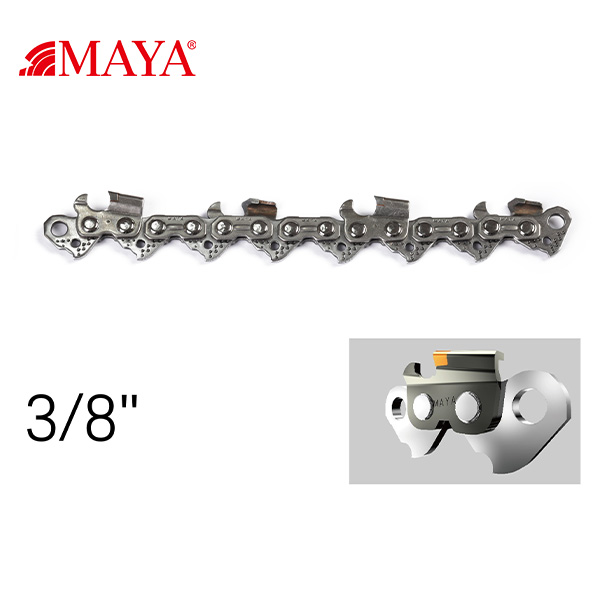Contact Us


News content

In the realm of chainsaws, the choice between a carbide saw chain and a regular steel chain can significantly impact performance and durability. These two types of chains vary in composition, cutting efficiency, longevity, and application versatility, each offering distinct advantages and drawbacks. In this comprehensive comparison, we delve into the intricacies of carbide saw chains and regular steel chains to help you make an informed decision.
Carbide Saw Chain: Carbide saw chains are crafted from a blend of carbon-based materials, with carbide being the primary component. Carbide, a compound of carbon and other elements such as tungsten or titanium, is renowned for its exceptional hardness, wear resistance, and heat resistance. The teeth of carbide chains are reinforced with carbide inserts, enhancing their cutting prowess and longevity. These inserts are strategically placed along the chain to withstand the rigors of cutting through tough materials, such as hardwoods, metals, and abrasive surfaces.
Regular Steel Chain: In contrast, regular steel chains are predominantly made from high-quality steel alloys. While steel chains are durable and reliable, they lack the hardness and wear resistance offered by carbide chains. Traditional steel chains may require more frequent sharpening and replacement due to wear and tear, especially when subjected to heavy-duty cutting tasks. However, advancements in steel alloy formulations have led to the development of high-performance steel chains with improved durability and cutting efficiency.
Carbide Saw Chain: The exceptional hardness and wear resistance of carbide make it ideal for cutting through tough materials with ease. Carbide saw chains exhibit superior cutting efficiency, slicing through wood, metal, and other challenging substances swiftly and smoothly. The carbide inserts maintain their sharpness for extended periods, minimizing the need for frequent sharpening and replacement. This enhanced cutting performance reduces strain on the chainsaw motor, enhances overall productivity, and prolongs the lifespan of the chain.
Regular Steel Chain: Regular steel chains deliver respectable cutting performance, particularly in softer materials. However, they may struggle when faced with dense hardwoods, abrasive surfaces, or heavy-duty cutting tasks. Constant sharpening may be necessary to maintain optimal cutting efficiency and prevent premature wear. Despite these limitations, high-performance steel chains offer improved durability and cutting performance compared to standard steel chains, making them suitable for a wide range of applications.
Carbide Saw Chain: One of the standout features of carbide saw chains is their remarkable longevity and durability. The hardness and wear resistance of carbide enable these chains to withstand prolonged use without succumbing to wear or deformation. Carbide inserts retain their sharpness and cutting edge for extended periods, resulting in minimal maintenance and downtime. As a result, carbide chains offer exceptional durability, making them a cost-effective investment in the long run for professionals and enthusiasts alike.
Regular Steel Chain: While regular steel chains are durable, they typically have a shorter lifespan compared to carbide chains. The softer nature of steel renders these chains more susceptible to wear, deformation, and premature failure, especially when subjected to heavy-duty cutting tasks or abrasive materials. Frequent sharpening and replacement may be necessary to maintain cutting performance and prevent safety hazards. However, high-performance steel chains with advanced alloy formulations offer improved durability and longevity, bridging the gap between traditional steel chains and carbide chains.
Carbide Saw Chain: Carbide chains excel in a wide range of applications, from woodworking and construction to metal fabrication and demolition. Their exceptional hardness, wear resistance, and cutting efficiency make them invaluable tools for professionals in various industries. Whether tackling hardwoods, metals, concrete, or composite materials, carbide chains deliver consistent performance and reliability, even in the most demanding cutting conditions. With their versatility and durability, carbide chains are the preferred choice for professionals seeking top-tier performance and longevity.
Regular Steel Chain: While regular steel chains are versatile, their performance may be limited in certain applications or cutting conditions. They are well-suited to lighter tasks, occasional use, or consumer-grade chainsaws. However, they may struggle with heavy-duty cutting tasks, dense hardwoods, abrasive materials, or prolonged use. Despite these limitations, high-performance steel chains with advanced alloy compositions offer improved cutting efficiency, durability, and versatility, making them suitable for a wide range of applications in both consumer and professional settings.
In conclusion, the choice between a carbide saw chain and a regular steel chain depends on various factors, including cutting requirements, application versatility, performance expectations, and budget considerations. Carbide chains offer unmatched durability, cutting efficiency, and versatility, making them the preferred option for professionals and enthusiasts seeking top-tier performance and longevity. However, regular steel chains remain viable choices for lighter applications, occasional use, or budget-conscious consumers. Whether opting for the rugged reliability of a carbide saw chain or the tried-and-true performance of a regular steel chain, proper maintenance and care are essential to maximize longevity and ensure optimal cutting performance. By understanding the nuances of each chain type and their respective benefits, users can select the ideal option to suit their cutting needs and preferences.
More
Explore the differences between hard nose and regular guide bars for chainsaws. Discover the benefits and applications of each type to make the right choice for your cutting needs.
The Harvester Processor Bar 75cm MAYA is a high-performance chainsaw part designed for heavy-duty applications in forestry and logging. Made with premium materials and foreign enterprise heat treatment, this bar offers exceptional durability. Available with OEM & ODM customization options.
Discover our high-quality 36 inch guide bar for Stihl 070 chainsaws, built from durable 50CrV4 material. Available with OEM services, this chainsaw spare part is suitable for a variety of applications. Learn more about packaging, lead time, and customization options.
Looking for the perfect tool for your gardening needs? Explore our selection of mini saw chains, designed for light duty work and home gardening tasks. With options powered by electricity, batteries, or gasoline, you'll find the ideal solution for your outdoor maintenance projects.
More
Email: qirui@qiruibar.com
Tel:0086-571-82308666
Add: No. 390, Xiangdafang Industrial Park, Wenyan Street, Xiaoshan District,Hangzhou,Zhejiang,China
Website: www.qiruibar.com



Contact Us
Contact Us
